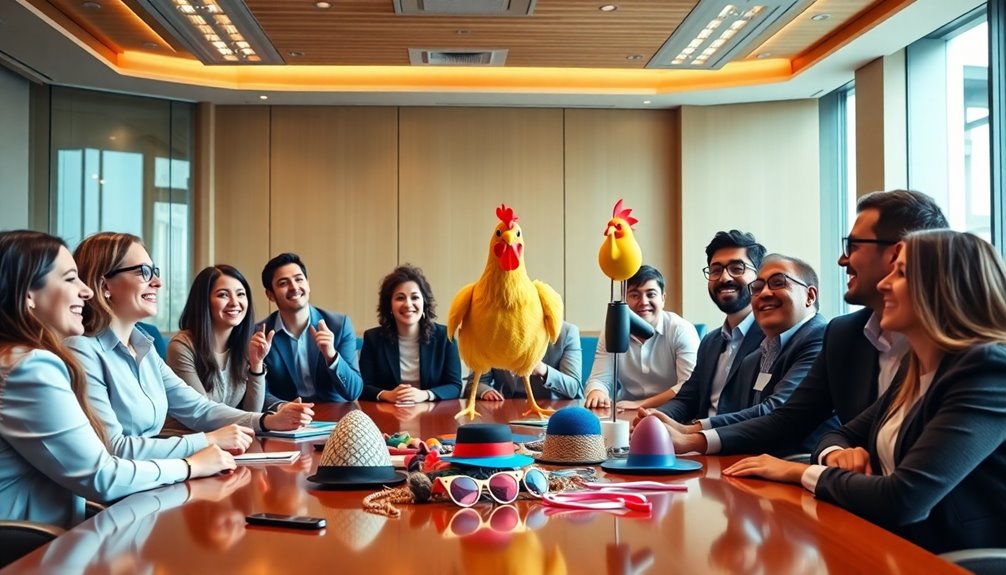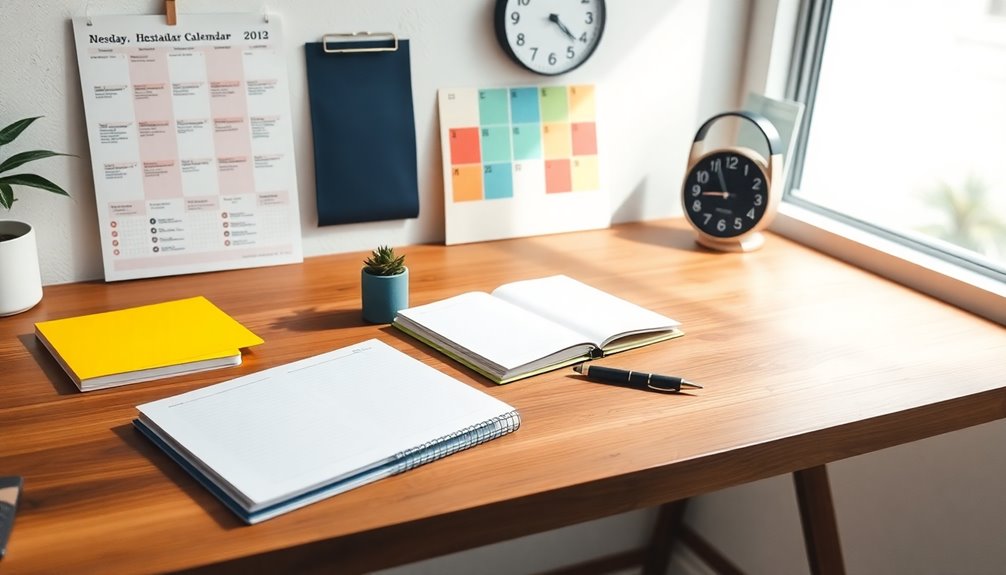You can beat the heat while impressing your interviewers by choosing the right attire. Opt for lightweight fabrics like cotton and linen to stay cool, and go for tailored shorts, knee-length dresses, or smart-casual trousers paired with light blouses. Pastel colors reflect heat and exude professionalism. Don't forget to groom yourself neatly and choose stylish but comfortable shoes that align with your outfit. Arriving prepared boosts your confidence, letting you focus on showcasing your skills. Want more tips on nailing that summer interview look? There's plenty of helpful advice just ahead!
Key Takeaways
- Choose lightweight fabrics like cotton and linen to stay cool while maintaining a professional appearance during summer interviews.
- Opt for tailored shorts with blazers or knee-length dresses to balance comfort and professionalism in hot weather.
- Prioritize well-fitting, clean outfits to enhance confidence and demonstrate attention to detail, crucial for making a positive first impression.
- Select stylish yet comfortable footwear, such as loafers or low heels, to ensure mobility and a polished look without sacrificing comfort.
- Prepare your outfit the night before to reduce last-minute stress and ensure you're ready to impress in the heat.
Overview of Summer Interview Attire

When preparing for a summer interview, you should focus on three key elements: comfort, professionalism, and appropriateness. The right interview outfits can make all the difference in how you present yourself. Since summer heat can be intense, choose breathable materials that keep you cool without sacrificing your professional look. Lightweight fabrics like cotton or linen are excellent choices.
Traditional workwear can feel stifling in warm weather, so consider lighter, more casual options that still convey professionalism. A light blouse paired with breathable trousers or a skirt strikes the perfect balance. While you want to stay comfortable, it's essential to steer clear of excessively casual items like crop tops or baseball caps, which can undermine your professional appearance.
Selecting Appropriate Outfits

Choosing the right outfit for your summer interview involves more than just picking something lightweight. You'll want to take into account the job role and the organization's dress code to guarantee your attire aligns with expectations. This not only shows respect but also demonstrates your understanding of the company culture.
Evaluate factors like travel time, outdoor temperature, and the interview location's climate. Selecting clothing that keeps you comfortable is key. Avoid excessively casual items, such as baseball caps and crop tops. Instead, opt for a professional outfit made from breathable fabrics like cotton, linen, or lightweight blends. These materials help you stay cool while maintaining a polished appearance. Additionally, consider incorporating essential oils for stress relief to help maintain a calm demeanor before your interview.
If you're unsure about the dress code, don't hesitate to ask the company beforehand. It's better to clarify than risk misalignment in your attire choices. Finally, prioritize comfort in your outfit selection. A well-fitting and breathable outfit not only enhances your focus but also boosts your confidence during the interview. By choosing wisely, you can beat the heat and impress your interviewers, setting a positive tone for your summer interview.
Summer Outfit Ideas

Often, summer interviews call for a balance between professionalism and comfort, so it's essential to reflect on outfit ideas that fit this dual requirement. Lightweight fabrics like linen and cotton blends are your best friends; they guarantee breathability while keeping your professional style intact.
If you're heading to a less formal interview, consider pairing tailored shorts with a blazer. This combination strikes the right note between polished and comfortable. Alternatively, knee-length or midi dresses made from breathable materials offer an elegant option that keeps you cool without sacrificing sophistication.
For a versatile option, smart-casual trousers paired with light blouses can create a balanced outfit that's perfect for summer interviews. Don't forget about accessories; keep them minimal to maintain focus on your interview attire. Comfortable shoes, like loafers or low heels, will help you navigate the day with ease while looking put-together. Additionally, adopting a growth mindset can enhance your confidence, allowing you to handle the interview's challenges effectively.
With these summer outfit ideas, you can confidently step into your interview, showcasing both your professionalism and your ability to keep cool under pressure.
Tips for Choosing Clothes

Five key tips can help you select the perfect attire for your summer interview. To keep cool and composed, focus on lightweight, breathable fabrics like cotton, linen, and rayon. These materials not only allow air circulation but also maintain a polished look.
| Tip | Details |
|---|---|
| Fabric Choice | Opt for lightweight, breathable fabrics. |
| Color Selection | Choose light or pastel colors to reflect heat. |
| Fit Matters | Guarantee a proper fit for comfort and professionalism. |
| Layer Wisely | Incorporate light cardigans or blazers for AC. |
| Comfortable Shoes | Prioritize loafers or low wedges for ease of movement. |
When you pick your outfit, remember that lighter colors can help you avoid sweat marks, keeping you looking sharp. A well-fitted ensemble enhances professionalism and allows for better comfort during long interview days. Also, since air conditioning can be chilly, layering is a smart move. Finally, choose comfortable shoes that match the formality of the interview, guaranteeing you can walk in confidence. Additionally, consider how different brewing methods can affect your caffeine levels to help you stay alert during the day.
Importance of First Impressions

First impressions happen in the blink of an eye, often within the first 30 seconds of meeting someone. When you dress professionally for your interview, you show respect for the opportunity and boost your own confidence, which can lead to better performance. Remember, how you present yourself can greatly influence the hiring manager's perception of you and your fit within the company culture. Furthermore, establishing clear boundaries can help you maintain professionalism and comfort during the interview process.
Instant Perception Formation
When you walk into an interview, the impression you make in those initial seconds can set the tone for the entire conversation. Your interview clothes play a pivotal role in crafting that first impression, especially in casual summer settings. Dressing appropriately not only signals professionalism but also showcases your understanding of the company's culture.
Here's a quick overview of how different attire can influence perceptions:
| Attire Type | Perception Impact | Suitable For |
|---|---|---|
| Business Formal | Highly professional | Corporate interviews |
| Smart Casual | Balanced professionalism | Creative industries |
| Casual Summer | Relaxed yet competent | Startups or informal roles |
| Overly Casual | Lack of respect for the process | Rarely suitable |
| Well-fitted & Clean | Confidence and attention to detail | Any setting |
Research shows that candidates who present themselves professionally are often favored over those who appear too casual, regardless of qualifications. Invest time in selecting the right outfit; it'll boost your confidence and leave a lasting positive impression. Additionally, regular maintenance of email lists can enhance your communication skills, which may also be beneficial during networking opportunities.
Professionalism Reflects Respect
Making a strong first impression is essential in an interview, and your attire plays a significant role in that moment. Research shows that a professional outfit can dramatically influence an interviewer's perception, often impacting hiring decisions within seconds. When you choose your clothing, consider the company's dress code and culture. Aligning your attire with these values shows respect for the organization and the interview process.
Opt for a polished look that fits into the business casual category, as this strikes a balance between professionalism and comfort, especially during the summer heat. A well-chosen outfit not only conveys seriousness but also helps you feel more confident and focused. When you present yourself professionally, it allows you to engage more effectively with the interviewer, showcasing your qualifications without the distraction of inappropriate attire.
Confidence Enhances Performance
A strong sense of confidence can transform your interview experience and enhance your performance. You might not realize it, but first impressions form in mere seconds. Dressing in a professional outfit not only reflects your respect for the opportunity but also sets the tone for how the interviewer perceives you. When you wear something that aligns with the company culture, it can greatly boost your confidence, making you feel more at ease.
Research shows that candidates who dress well are often viewed more favorably by interviewers. This is because a carefully chosen outfit can empower you, improving your communication and body language during the interview. When you feel confident in what you wear, you project an air of self-assuredness that can positively influence the entire interaction. Additionally, spiritual principles can serve as reminders of your inner strength and resilience, helping you to approach the interview with a calm and focused mindset.
Grooming and Hygiene Essentials

When you step into an interview, your grooming speaks volumes about your professionalism. Make sure your hair is neat and styled appropriately, your nails are clean and well-groomed, and opt for subtle fragrance choices that won't overwhelm. These small details can help you create a polished image that leaves a lasting impression.
Neat Hair and Style
To create a polished appearance for your summer interview, focus on neat hair and style that reflect professionalism. Styles like low chignons, ponytails, or braids are ideal, as they keep your hair off your face and neck, helping you stay cool despite the summer heat. Make certain your hair is clean and styled according to your industry's standards; this attention to detail can greatly boost your confidence and make a strong first impression.
When it comes to makeup, aim for a fresh, natural look. A tinted moisturizer paired with neutral lip colors will keep you looking professional without the risk of heavy products melting away in the heat.
Regular grooming is essential, so pay attention to every detail. Neat hair, combined with clean and well-kept nails, reflects your professionalism and commitment to presenting yourself well.
Finally, opt for subtle, light fragrances to maintain a pleasant scent without overwhelming anyone in close quarters. Avoid strong perfumes, especially in warm weather, to prevent discomfort during the interview. By following these grooming tips, you'll convey a polished appearance that leaves a lasting impression. Additionally, consider the impact of proper toilet maintenance on your overall hygiene, as clean and well-maintained restrooms are crucial in professional environments.
Clean, Well-Groomed Nails
Attention to grooming extends beyond hair; clean, well-groomed nails play a significant role in your overall professional appearance. When you walk into an interview, your nails can subtly communicate your attention to detail and professionalism. If they're dirty or unkempt, it can leave a negative impression, overshadowing your qualifications.
To maintain a polished look, choose neutral or subtle nail polish shades instead of loud colors or intricate designs. This approach keeps your appearance professional and helps you stand out for the right reasons. Regularly trimming and filing your nails is essential to prevent snagging or breakage, ensuring they always look neat.
Proper nail hygiene is vital, too. Make sure your nails are clean and free from dirt, which reflects personal care and professionalism. If you want an extra touch, consider a simple manicure, but make sure it aligns with the industry standards for professionalism. Additionally, incorporating cruelty-free products into your nail care routine can further demonstrate your commitment to ethical beauty standards.
Subtle Fragrance Choices
While fragrance can enhance your overall impression during an interview, it's crucial to choose subtle options that won't overwhelm your interviewer. Opt for light scents, like citrus or floral fragrances, which are invigorating and less likely to be overpowering in warm weather. These subtle fragrances can subtly elevate your presence without becoming a distraction.
When selecting your fragrance, aim for those with a limited number of notes. Strong scents can easily overwhelm the senses, so keep it simple and light. Applying your fragrance to pulse points, such as your wrists and behind your ears, allows the scent to emanate gently, providing an invigorating presence throughout your interview.
Instead of heavy perfumes, consider body sprays or deodorants that offer light, pleasant scents. This way, you maintain a professional aura while ensuring your fragrance is subtle and inviting. Also, avoid applying fragrance right after showering, as the heat from your body can amplify the scent. Instead, give it a few minutes before your interview to find the perfect balance. By following these tips, you can confidently present yourself while keeping your fragrance choices discreet and effective.
Preparing for Interview Day

On the evening before your interview, lay out your outfit to guarantee it's clean, pressed, and ready to wear. This simple act reduces last-minute stress and helps you look and feel confident. Preparing for interview day is all about being organized and calm. Here are four essential items to pack in your professional bag:
- Copies of your resume – You never know who might need one!
- A notepad and pen – Great for jotting down notes or questions during the meeting.
- An umbrella or light jacket – Weather can be unpredictable; staying comfortable keeps you cool.
- Transportation plan – Arriving early lets you check your appearance and gather your thoughts.
Consider taking a breather at a nearby coffee shop or restaurant before your interview. This will give you a moment to relax, mentally prepare for your questions, and reduce anxiety. Prioritize comfort over cost when planning your travel, and allow extra time to ascertain you arrive without panic. Additionally, being prepared with strong communication skills can significantly enhance your chances of making a positive impression. With these tips, you'll be all set to impress while staying cool in the summer heat!
Final Touches for Success

As you gear up for your interview, don't overlook the final touches that can elevate your overall presentation. To maintain a polished appearance, make certain your outfit is clean, pressed, and free of wrinkles. This attention to detail greatly impacts your professional image, especially during a summer interview.
Arrive early to allow time for final grooming checks. Take a moment to adjust your hair or makeup, making sure you feel confident and look your best before the interview starts. Lightweight and breathable undergarments can enhance your comfort and help you avoid overheating, allowing you to focus on the conversation rather than discomfort.
Consider carrying a portable fan or cooling towel to manage heat before entering the interview space. This guarantees you arrive feeling fresh and composed. Finally, stay hydrated by drinking water prior to the interview. Staying hydrated not only boosts your energy levels but also aids in maintaining focus and clarity during the discussion. By incorporating these final touches, you'll set yourself up for success, making a lasting impression on your interviewers.
Classic Attire Ideas

When it comes to summer interview attire, choosing the right outfit can make all the difference in your confidence and comfort. You want to impress while staying cool, so here are some classic outfit ideas for your summer job interview.
- Lightweight Fabrics: Opt for linen or cotton blends to keep breathability in mind while looking polished.
- Tailored Light-Colored Suit: A light suit paired with a smart blouse and knee-length skirt strikes a perfect business formal look.
- Chic Midi Dress: Consider a midi dress in breathable materials that allows for movement and maintains elegance, suitable for various interview settings.
- Smart-Casual Pairing: Combine structured tops with tailored shorts for a smart casual look that balances professionalism and comfort.
Finish your outfit with stylish yet comfortable shoes, like loafers or low heels, ensuring ease of movement. Remember, the right summer interview attire not only helps you look good but also boosts your confidence, allowing you to focus on showcasing your skills and personality.
Frequently Asked Questions
What Is Appropriate to Wear to an Interview in the Summer?
When you're heading to a summer interview, focus on lightweight, breathable fabrics like cotton or linen. Go for light colors to keep cool and minimize sweat visibility. A tailored option, like an unlined suit or a smart blouse with an ankle-length skirt, can keep you looking polished. Avoid overly casual items like flip-flops, and choose closed-toe shoes or loafers for a balance of professionalism and comfort. Always consider the company culture too!
Can I Wear Shorts to an Interview if It's Hot?
You might think wearing shorts to an interview is a smart choice when it's hot, but it can come off as unprofessional. While tailored shorts paired with a polished top could work in a casual environment, it's risky. Always research the company's dress code first. Instead, try lightweight trousers or a knee-length skirt. Staying cool is important, but maintaining a professional appearance is essential for making a good impression.
What Shoes to Wear to a Summer Interview?
When choosing shoes for a summer interview, opt for loafers or closed-toe flats made from breathable materials. They'll keep you comfortable and professional during your interview. If you prefer heels, stick to open-toed options that look polished and fit the company's dress code. Avoid casual footwear like sandals or flip-flops, as they can undermine your professional image. Look for shoes with cushioned insoles and neutral shades for a versatile and stylish choice.
What to Wear to an Interview When You Don T Have Nice Clothes?
Imagine stepping into the interview room, confidence radiating from your polished appearance. If you don't have nice clothes, don't worry! Borrow or rent a professional outfit, or explore thrift stores for hidden gems. Focus on versatile pieces like a tailored blazer paired with items you already own. Accessorize minimally but effectively, and make sure everything fits well. A clean, neatly pressed look can outshine expensive brands, leaving a lasting impression.
Conclusion
In the heat of summer, think of your interview attire as the icing on a cake—it's the finishing touch that makes a lasting impression. Just like a well-decorated cake draws people in, a polished outfit can set you apart from the competition. Remember, your confidence shines brightest when you feel comfortable and put together. So, dress smart, stay cool, and let your personality take center stage. You've got this!
Felicity, our Author, pens in-depth articles and guides that delve into the heart of personal discovery. Her narrative-driven approach weaves together theory, practice, and personal anecdotes, making the journey of self-exploration both relatable and inspiring. Felicity’s contributions help illuminate the path for those seeking a deeper understanding of themselves and their relationships.










